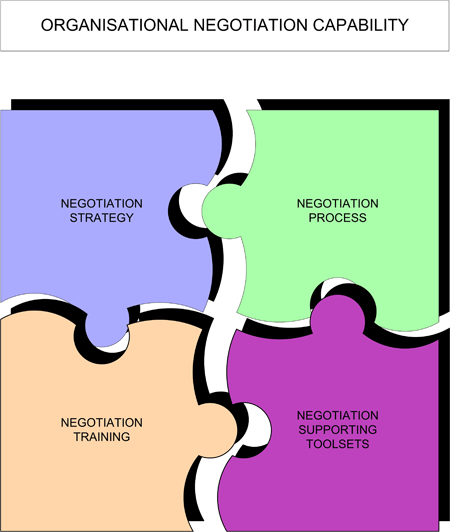| Negotiation Training and Sales Strategy |  |
| Create a negotiation sales strategy for your organization. One approach to creating a negotiation strategy is mapped out in summary. .tb_button {padding:1px;cursor:pointer;border-right: 1px solid #8b8b8b;border-left: 1px solid #FFF;border-bottom: 1px solid #fff;}.tb_button.hover {borer:2px outset #def; background-color: #f8f8f8 !important;}.ws_toolbar {z-index:100000} .ws_toolbar .ws_tb_btn {cursor:pointer;border:1px solid #555;padding:3px} .tb_highlight{background-color:yellow} .tb_hide {visibility:hidden} .ws_toolbar img {padding:2px;margin:0px} |
ESTABLISHING AN ORGANISATIONAL NEGOTIATION CAPABILITY
There are several primary reasons that support the need for a strategic organisational sales negotiation capability:
- Contract agreements are becoming more intricate - it is just simply not true any more to think that it is just about settling on the price.
- Sales teams are confronting professional buyers in the marketplace - Many of today's buyers have taken negotiation skills training and view a negotiation as a means to an end.
- Competitive behaviour in the marketplace has to a greater extent become unreasonable - a strategic approach to negotiation can be applied as an effective means to combat price wars and detrimental standards.
- Relationships are becoming increasingly long term. Organisations must discover ways to develop relationships outside the accustomed 'discounting approach'.
- There is a noteworthy amount of internal sales negotiations that are taking place within organisations - a strategic approach to negotiations allows organisations to develop a shared negotiation objective, possess a common vocabulary, and effectively negotiate between departments.
To achieve maximum competitive advantage and avoid the drawbacks associated with finishing in the 'bunch', organisations must employ whole brain negotiation leading practice in the following crucial areas:

- Sales Negotiation strategy definition/refinement
- An organisational or departmental negotiation strategy must support the organisational strategy. This serves to ingrain negotiation as a primary expertise at the organisational or departmental level. A negotiation strategy will define specific concepts such as:
- No discounts should be offered without receiving a concession of greater or comparable value.
- All negotiations in excess of $ XXX must apply the defined negotiation methodology and supporting toolsets.
- All marketing, sales and purchasing personnel must be trained in basic and advanced negotiation skills.
- An organisational or departmental negotiation strategy must support the organisational strategy. This serves to ingrain negotiation as a primary expertise at the organisational or departmental level. A negotiation strategy will define specific concepts such as:
- Sales Negotiation Skills process definition/refinement
- A negotiation methodology or process must support the negotiation strategy and provides a means to take a consistent approach to business negotiations. The following examples of a business negotiation process could include:
- Qualify agreements
- Define specific negotiation objectives (for self & counterparty)
- Consider agreement alternatives (for self & counterparty)
- Use appropriate framing
- Create a suitable negotiation climate
- Trade
- Close
- A negotiation methodology or process must support the negotiation strategy and provides a means to take a consistent approach to business negotiations. The following examples of a business negotiation process could include:
- Sales Negotiation Training implementation
- Negotiation training will be most effective when it is used in conjunction with the organisational or departmental negotiation strategy & process. This will make certain that it is 100% relevant and has the most advantageous impact on the negotiated outcomes.
- Sales Negotiation supporting toolset deployment
- Subsequent to any training implementation, it is vital to equip negotiators with relevant toolsets that will serve to empower them when they apply their new found skills in their vocational environments on a day to day basis. Examples of supporting toolsets are:
- Deal objectives analysis sheets
- BATNA analysis sheets
- Concession strategy sheets
- Subsequent to any training implementation, it is vital to equip negotiators with relevant toolsets that will serve to empower them when they apply their new found skills in their vocational environments on a day to day basis. Examples of supporting toolsets are:
MAXIMISING THE RETURN ON YOUR NEGOTIATION TRAINING PROGRAMME INVESTMENT
As an example, a successful sales negotiation programme will provide:
Sales revenue growth
- A sales negotiation training plan that is appropriately conceived and implemented will produce more revenue as a result of a higher ratio of successful agreements when supported by the use of:
- A detailed definition of negotiation objectives (for all parties to the negotiation).
- By 'framing' an appropriate agreement (concentrating on the achievement of specific objectives).
- A thorough analysis of one's BATNA (Best Alternative To a Negotiated Agreement).
- By shaping an appropriate sales negotiation climate.
- By using suitable negotiation strategies & tactics.
Gross margin growth
- An effective sales negotiation training plan will prevent the losses that arise from excessive discounting. This will result in aggressive growth in gross margins as a result of:
- Applying a concession strategy when creating an agreement by ensuring a trading mentality as opposed to a discounting mentality.
- Implementing the IT Negotiation process to support leading negotiation practices.
Shorter sales cycles
- As a result of better negotiation preparation and by utilizing supporting negotiation toolsets, deal cycles will be significantly diminished. There will be fewer surprises. Purchasing strategies and techniques will be better understood & managed throughout the deal cycle.
Profitable service level agreements
- When an agreement has been reached, and all parties to the agreement feel that they have achieved an outcome consistent with their objectives, it is far more likely that they will remain committed to the deal over time. This is an important consideration particularly where the result of an agreement is a partnership of several years duration. Agreements often deteriorate after closure if one or more of the parties feel that they have not been recognized for their contribution to the agreement. This situation can be prevented by achieving Win More/Win More agreements that meet the needs & interests of all parties to the agreement.
A reduction in losses associated with litigation
- By achieving a greater number of Win More/Win More negotiated agreements, there will be far fewer losses as a result of legal proceedings. This will happen as a result of applying an energetic, leading practice based preparation platform. This will aid negotiators in identifying all the relevant needs & interests that must be satisfied to support lasting and profitable agreements.
RETURN ON INVESTMENT EXAMPLE:
The following is a simple example of a sales organisation that utilizes 10 sales resources and 3 pre-sales resources. The following assumptions have been made:
- Average sale value of $100000.
- An average of 60 sales deals closed on a yearly basis.
- An average gross margin of 25% per sales contract.
- As a result of a generic sales negotiation training programme, an improvement of only 5% is expected in:
- Average sale value
- The average number of deals closed
- The average gross margin per sale
- The length of the typical sales cycle
- A sales negotiation training investment of $20000
WHAT CAN I DO RIGHT NOW TO ENHANCE MY NEGOTIATION OUTCOMES?
Now that we've briefly examined the elements of a successful negotiation programme, let's explore the 4 most important means that you can immediately apply to your situation that will have a significant positive impact on your negotiation outcomes:
1. Define your Sales negotiation strategy:
- The answers to the following questions will give you some guidance as you consider your organisation's negotiation strategy:
- What group or groups of people in your organisation should be adept to negotiate effectively in their respective profession?
- What are the primary negotiation traits of successful negotiators in your organisation?
- Should you allow any free products or services to your clients?
- Should you be offering any concessions to your counterparts without receiving a counter concession of equal or greater value in return?
- Who are the leaders in your organisation for the carrying out of the foremost practice negotiation skills?
- How will you gauge success in the negotiation environment - consider both leading and lagging indicators.
- What specific actions will you need to take to apply an organisational negotiation strategy?
2. Implement a supporting negotiation process for your sales growth:
- Once you have outlined your sales negotiation strategy, it is vital to assemble and implement a negotiation process to guarantee the effective application of the strategy. The negotiation process must be energetic and have a high effectiveness for its users. The single most primary consideration in implementing a negotiation process is to ensure that the leading negotiation practice is consistently applied across the department or organisation. Additionally, this will create a shared vocabulary and a common platform for the evaluation, refinement and improvement of negotiated outcomes. Build your negotiation process around the following key areas:
- Agreement requirements
- Aspiration base
- Real base
- Contracting zone
- BATNA analysis (Best Alternative To a Negotiated Agreement)
- Negotiation role definition
- Identify negotiation objectives (for all parties to the negotiation)
- Team composition
- Deal specific negotiation strategy & tactics
- Framing
- Negotiating climate
- Negotiation debriefing
- Agreement requirements
3. Implement a sales negotiation training programme
- All participants in the negotiation process should be trained in its use and application when the organisational negotiation process has been defined.
4. Create a negotiation support environment
- It is crucial that executives develop an environment that supports the development and application of an organisational negotiation capability. These are not jusSome of the primary enablers are:
- Creating an environment for negotiators to simulate sales negotiations on a continuing basis (on a quarterly or bi-annual basis)
- Building a negotiation reference database - in its most basic form, this would entail creating a log of resources with specific reference to the types of negotiation and relevant experience of organisational negotiators
- Automating the use of tools to support the implementation of the negotiation process
- Providing an individual coaching environment where managers can train staff in leading negotiation practice
The creation of a corporate negotiation capability is not an easy task. It will require dedication and commitment at the organisational level, as well as recruiter responsibilities. If approached carefully and applied wisely, the investment that is coupled with the establishment of an organisational negotiation capability will result in spectacular returns that will entrench competitive differentiation and enhance returns to the stakeholder.
To your success!
Back to Negotiation Articles
We welcome the republication of this page's contents in part or full - we just ask that you include a clean link back to this site, to our www.negotiationtraining.com.au/training/ page.
|
Reader Comments
Average Reader Rating:
share your comment |
|
|
No comments |






Reader Comments
Average Rating:
Total Comments: 0